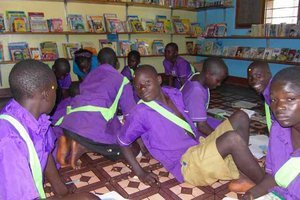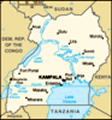Advertisement

 Students in the library at Amagezi
Students in the library at Amagezi
Students in the library at AmageziIt’s hard to believe, but I’m now at the end of week four of my seven weeks in Uganda. The past few weeks have been incredibly busy, both with work and socialising! Access to the internet is limited, and power has been pretty erratic, so I’m grabbing an opportunity to upload this now and have another entry half-written to follow soon. Struggling with photos at present as the uploader is playing up, but have added them to the previous two so you can start to get a picture and managed to get a few in here. Loads more to come later. Thanks to all who have posted messages - please keep them coming! It's great to hear from home - sometimes I feel very far away, and texts and emails often seem to be going astray.
I’m very much in the swing of my work here at Soft Power’s Amagezi Education Centre. Students are driven here each day from schools all around the sub-county of Budondo and beyond: around 60-80 arrive each day on the back of two open-sided trucks.
The aim is to give them a taste of a more interactive, group-based style of learning, exposing them to

 Making organic pesticides in the agriculture lesson
Making organic pesticides in the agriculture lesson
Making organic pesticides in the agriculture lessonresources and subjects they can’t access at school. Ugandan schools tend to focus only on the core subjects, like maths, English, science, agriculture and geography. Teaching styles used are very traditional and generally out of favour in the UK: chalk and talk, rote learning, chanting, drilling, repetition - but with class sizes of anything up to 170 teachers struggle to give any individual attention, and group work or active learning is pretty much out of the question.
The students who come to Amagezi are all from Primary 6, the second-to-last year of primary school, so in theory they’re aged 11-12, but the reality is that many children have to drop out to earn money before returning to complete a year, and P6 students can easily be as old as 16. In one school I’ve visited a 25-year-old man is still working to complete P7 in order to make the transition to secondary school. Primary education is technically free, but students are required to buy their own uniforms and school meals, expenses that present a real challenge to families struggling to support 6, 8 or even 12 children.
During the day at Amagezi the children are divided into four

 With friends at St John's secondary school
With friends at St John's secondary school
With friends at St John's secondary schoolgroups and each one has a session in two subjects: drama, art, library and IT. Back at school another two groups have sessions from the outreach team in science and agriculture. They get input on sexual health, malaria prevention, sustainable and organic farming methods and nutrition.
There is some great work going on at the centre and through its various outreach programmes. The library here is the only one for miles around and, with little culture of reading here, either in English or local languages (and even fewer resources), for many children this is their first opportunity to choose, read and enjoy books.
I’ve managed to get involved with various projects, including working with the librarian to reorganise and label books so they’re easier for students to find, helping with classes in English for local women, looking at the new pre-school lesson plans which have just been introduced, observing and giving feedback on lessons, developing new learning resources, and even a bit of teaching!
IT lessons have been particularly eye-opening for me. In the UK I take computers for granted and, like many people, rely on them for communication, arranging my social life and finding out information,

 Crammed in at St John's dorm
Crammed in at St John's dorm
Crammed in at St John's dormnot to mention for making a living. A good number of children in the UK start school at 4 or 5 already adept at using a games console, mouse, the internet and various applications. The students who come to Amagezi may have had IT lessons before, but they will almost certainly have been entirely theoretical. Many touch (or even see) a computer for the first time during their session at the centre. This means that, aged anything between 11 and 16, they are often trying to use a mouse for the first time in their lives.
Coming from rural villages with no running water, let alone electricity, they have almost no concept of the role of computers in the developed world or even in urban Africa. I’ve been trying to devise a learning activity to help them understand with examples that are relevant to their experience, and cheerfully included a statement about computers being used to work out how much has been sold in a supermarket. This, along with a naïve reference to factories, has now been removed. Supermarkets only exist in the towns, and they use calculators and hand-written receipts. Stocktaking and ordering is of course done with pen and paper.
On Monday I stepped into a staffing gap and actually taught the library lesson to two groups. It’s the kind of lesson I have taught to Year 7 students back home many times - introducing the library, reading and discussing books, helping students to choose and read books - in theory a perfectly easy thing for me to do. The scary bit was trying to communicate enthusiasm and get students participating when I don’t speak the local language! Luckily for me, the school visiting that day do follow the government regulations about teaching in English from P3 onwards, so these students’ English is pretty good. I also had a teacher to help me with Lusoga translations when I failed to communicate clearly, so what could have been a pretty challenging day was actually really good fun!
I struggle to describe my emotions when confronted with the endless challenges faced by people in trying to get an education and move forward with their lives. A mixture of humility, anger, grief and admiration might get halfway there. In one family I know the eldest daughters take it in turn to drop out of school and work to support each other so they can stay in secondary school. Mum is busy with the little ones and dad, like quite a lot of men round here, has a second family, although he does seem to offer some financial support.
People scrape together the cash to get their children through secondary school, but I’ve met few people who managed to finish A Levels and fewer still who have managed to get any further education. I had a long conversation recently with a passionately committed deputy headteacher of a primary school who made it through to S4 and the equivalent of GCSEs. Some primary school teachers have no secondary education at all.
I have nothing like enough experience to have a valid opinion on the solutions, but the views of local friends and colleagues (women especially) are pretty much unanimous: reduce family size. There is a seemingly endless cycle of deprivation and lack of understanding. Poor education leads to lack of understanding of fertility cycles and contraception, which leads to poor family planning, which leads to large families, which leads to limited resources for education, which leads to poor education. And so the country stays poor, and the few who have the means to acquire the level of education we take for granted back home either join the ranks of the rich, struggle to distribute their earnings around extended families, or leave the country for better opportunities overseas.
Women especially have the least access to education and as a result are utterly disempowered. A friend in the village, the mum of the two girls I mentioned earlier, is two years older than me, has six surviving children, the smallest of whom is 15 months old. They’re all girls, which is not considered an asset round here. When (‘if’ isn’t really an option) they marry, they will bring bride price to the family but will leave to live with the husband’s family, eventually leaving the mother alone. I am so grateful to have been born in the developed world and to have had the educational and job opportunities I have.
More on life here, including trips to track the gorillas at Bwindi and to see Murchison Falls, as soon as I can manage! Remember, if you would like to donate to Soft Power's work here, you can do so via my Just Giving page: http://www.justgiving.com/bekkainuganda/
Advertisement
Tot: 0.087s; Tpl: 0.011s; cc: 12; qc: 51; dbt: 0.0552s; 1; m:domysql w:travelblog (10.17.0.13); sld: 1;
; mem: 1.2mb







